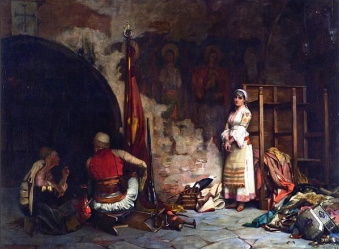Peter Jeffreys is an associate professor of English at Suffolk University, Boston, MA. He has written and edited a number of books on the Modern Greek poet C.P. Cavafy: Eastern Questions: Hellenism and Orientalism in the Writings of E. M. Forster and C. P. Cavafy (2005); The Forster-Cavafy Letters: Friends at a Slight Angle (2009); C.P. Cavafy: Selected Prose Works (2010); Reframing Decadence: C.P. Cavafy’s Imaginary Portraits (2015). His occasional ventures into the realm of creative writing include the following poems: “Seraph” (Paradise in Limbo Literary Arts Magazine, 2016); “Arrangement in Black and Gray: After Whistler” (Ergon: Greek American Transnational Arts and Letters, Fall 2017) and “Greek Necropolis” (C.P. Cavafy Forum, University of Michigan, Fall 2018).

Maiden sister of a mountain fighter
spinster of Solos
overshadowed by her brother’s fame
victim of his valor.
Life in the family shadows
rural farm chores
deadening domesticity
the imperious wives of siblings.
One solace only
the nearby chapel
Saint George’s cool
domed shelter.
Filling vigil lamps with olive oil
trimming beeswax candles
polishing church silver—
sterling wedding crowns
she’ll never don—
(these days the local palikars
romance their rifles).
Ibrahim Pasha of Egypt
sent to quell rebellion
settling the score
with Solos’ chieftain.
Full of fury
fields laid waste
dwellings burnt—
Saint George’s church despoiled
the Virgin Mary’s icon cheek
slashed by the Satrap’s saber.
Accosted by the ravager of Morea
a living virgin ravished.
Saint George, her mounted
red-crossed soldier-saint—
patron of her prayers—
now rears himself before her
demonically transformed
a turbaned fiend.
Abducted by her nightmare knight
whisked off to Alexandria’s slave bazaar—
a harem’s hell—
sharing Cleopatra’s vanquished fate.
Hapless, asp-less,
her only venom
shame.
Ransomed years later
the sum exorbitant.
A price far worse—
her name erased
forgotten by her clan—
disgraced
the memory of infamy
repressed.
Peter Jeffreys © 2020
For other contributions by Peter Jeffreys, please follow the links below:
Poetry in this post: © Peter Jeffreys
Published with the permission of Peter Jeffreys

